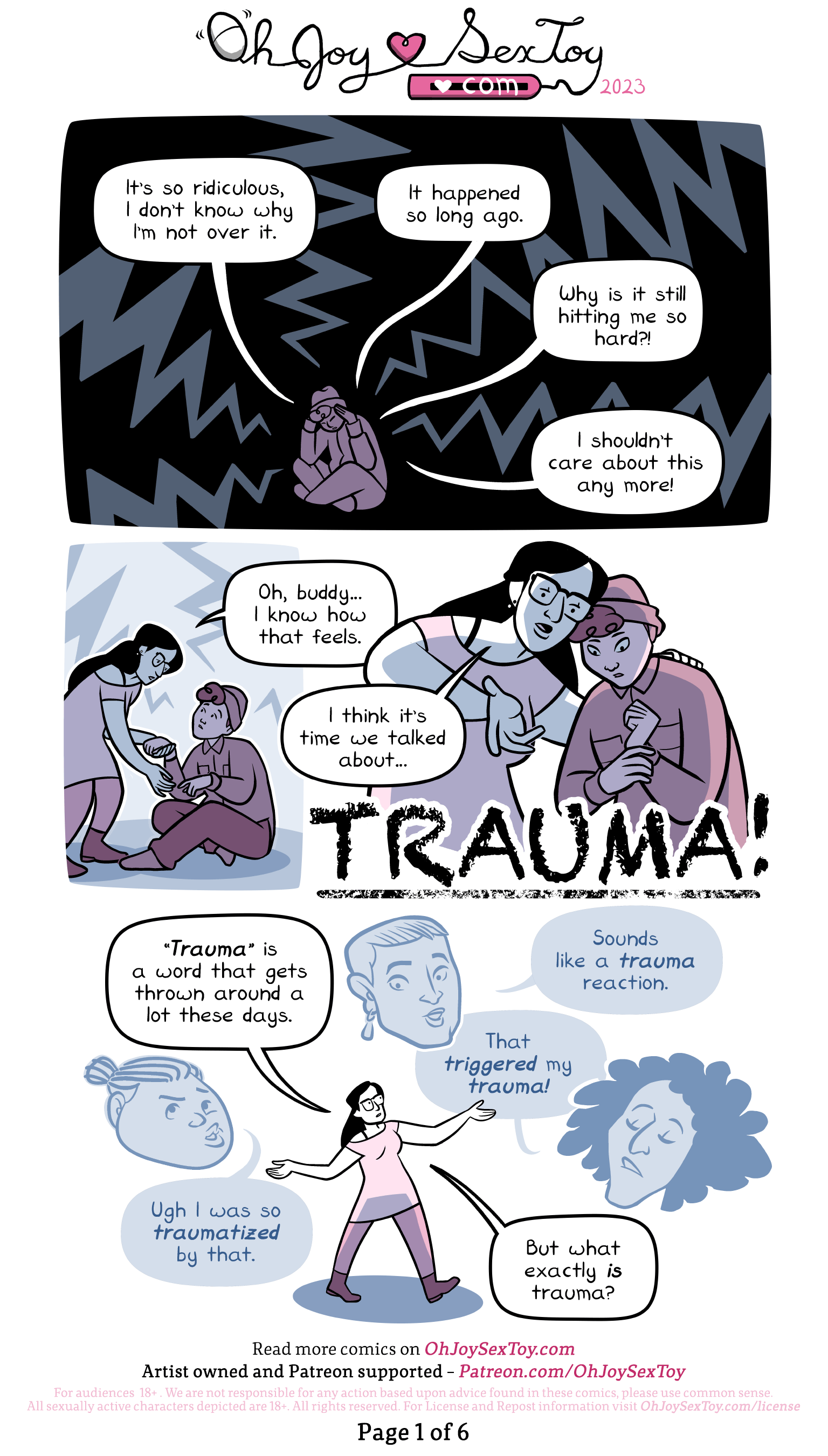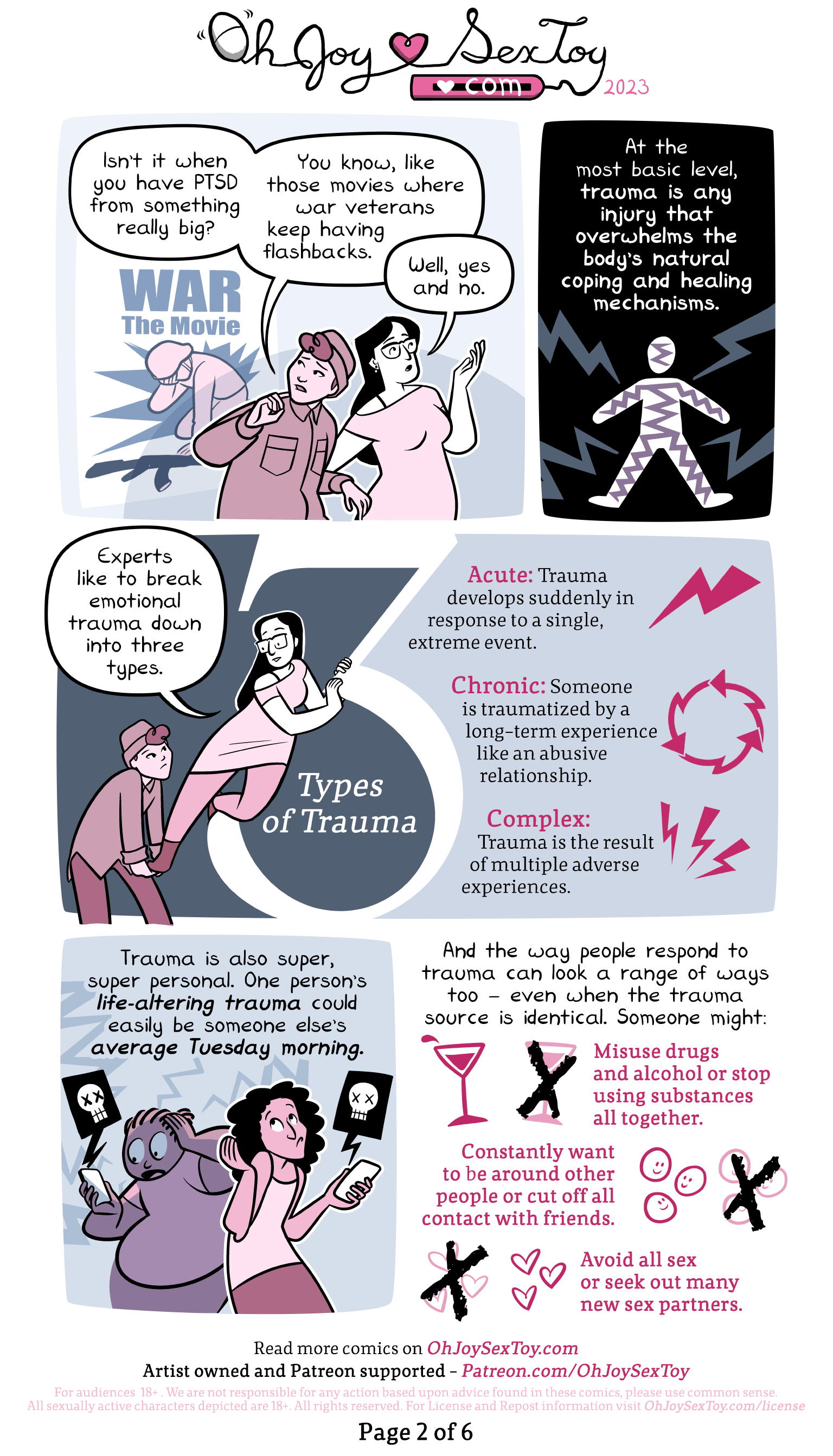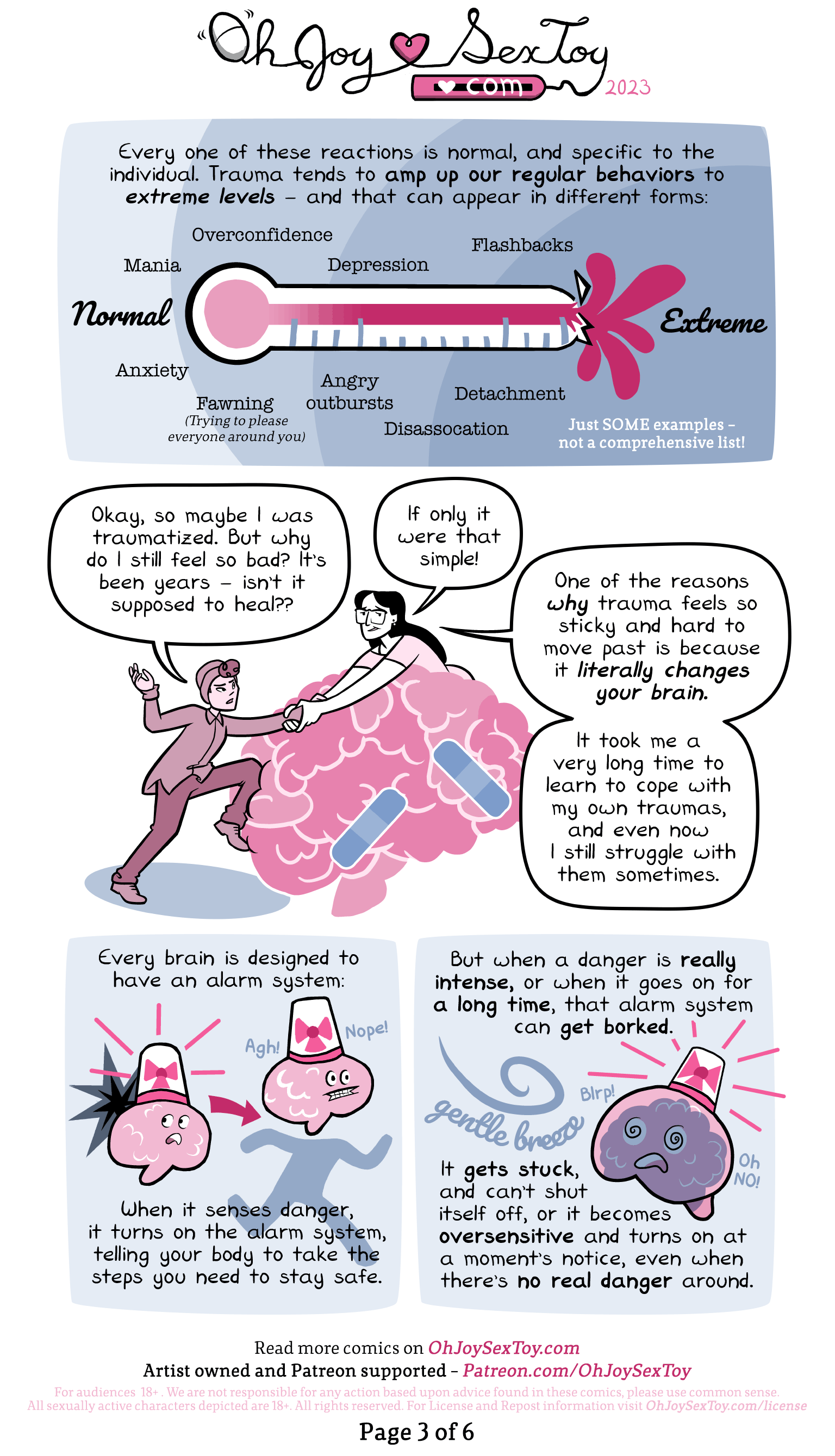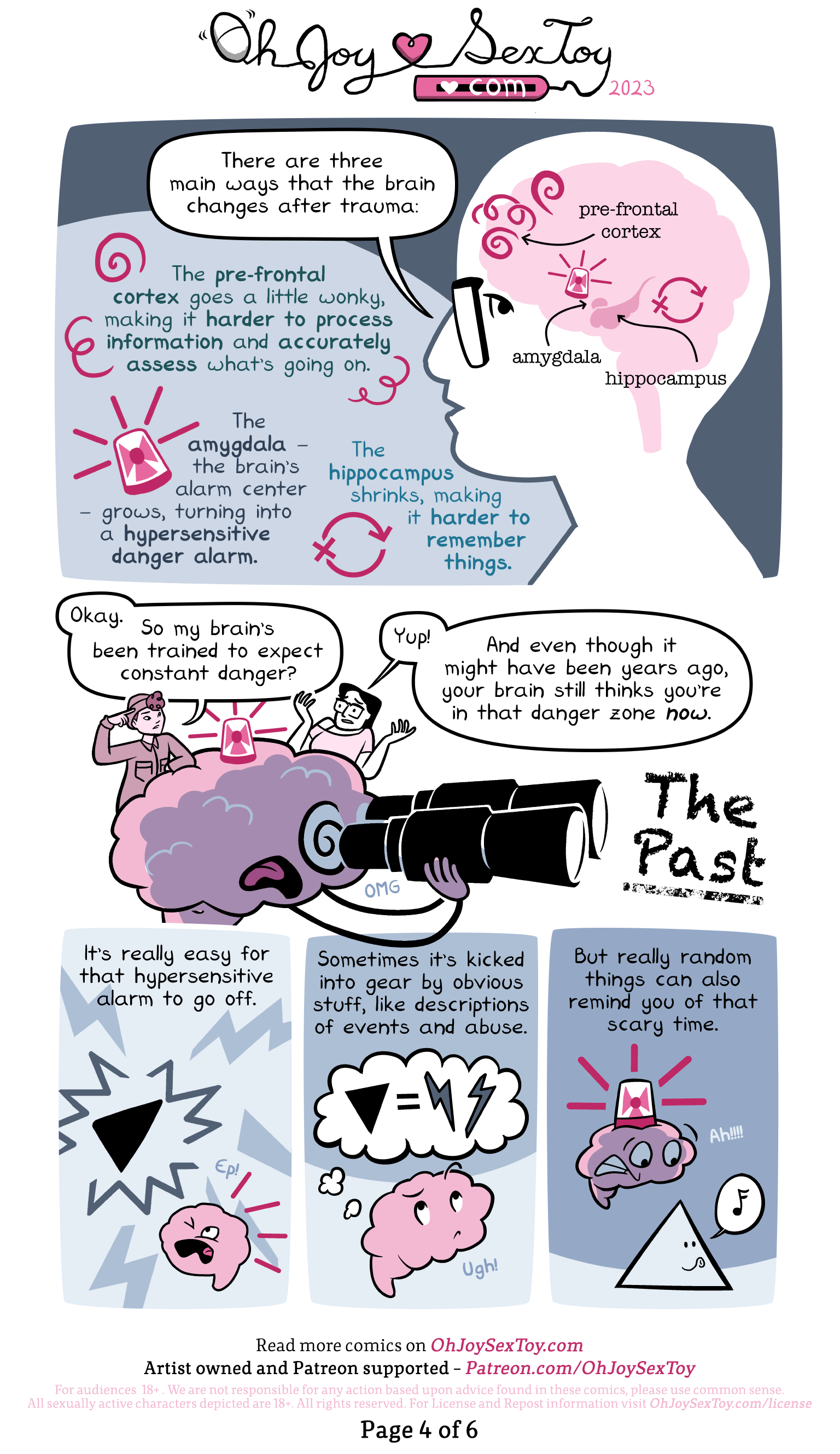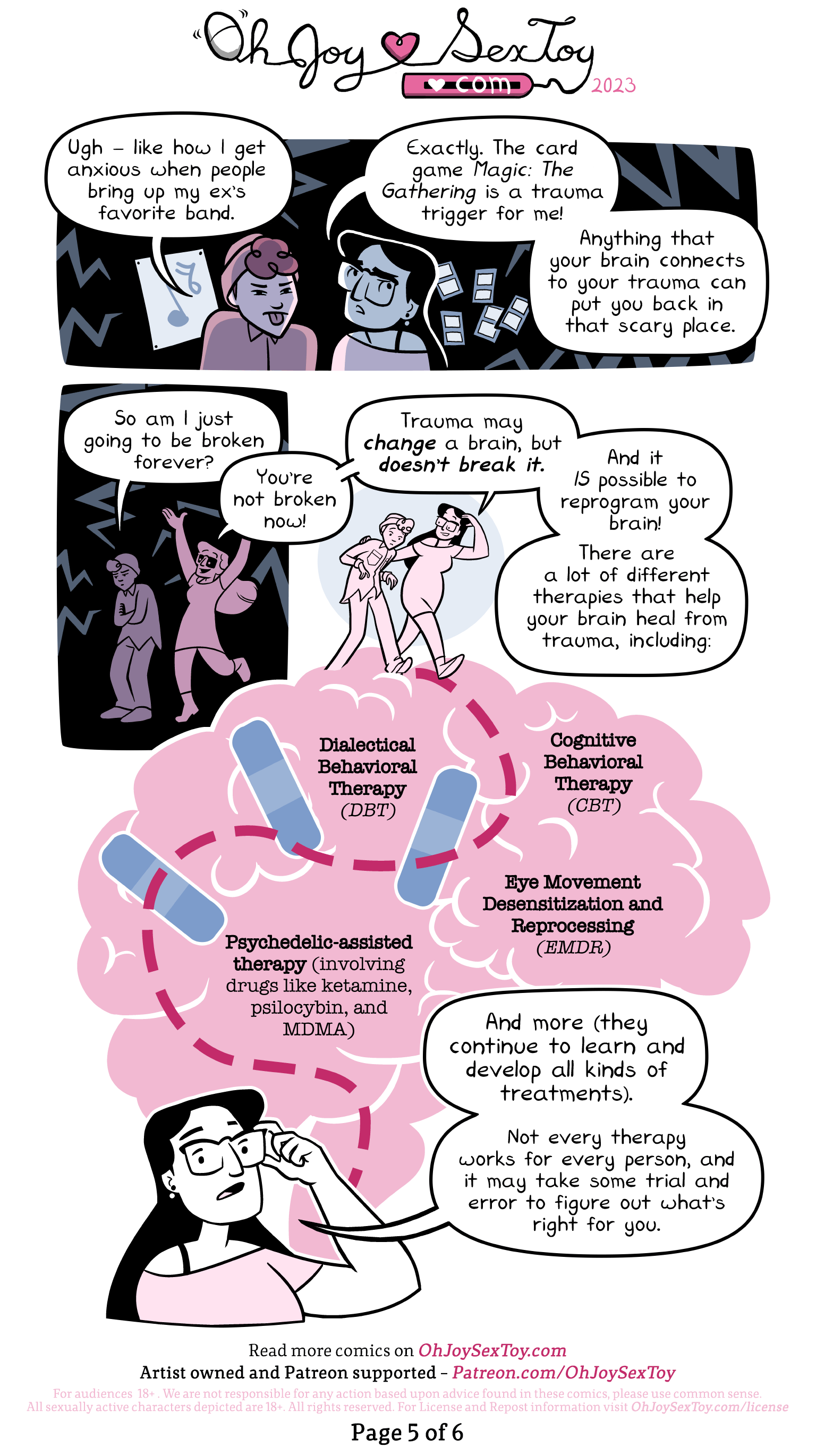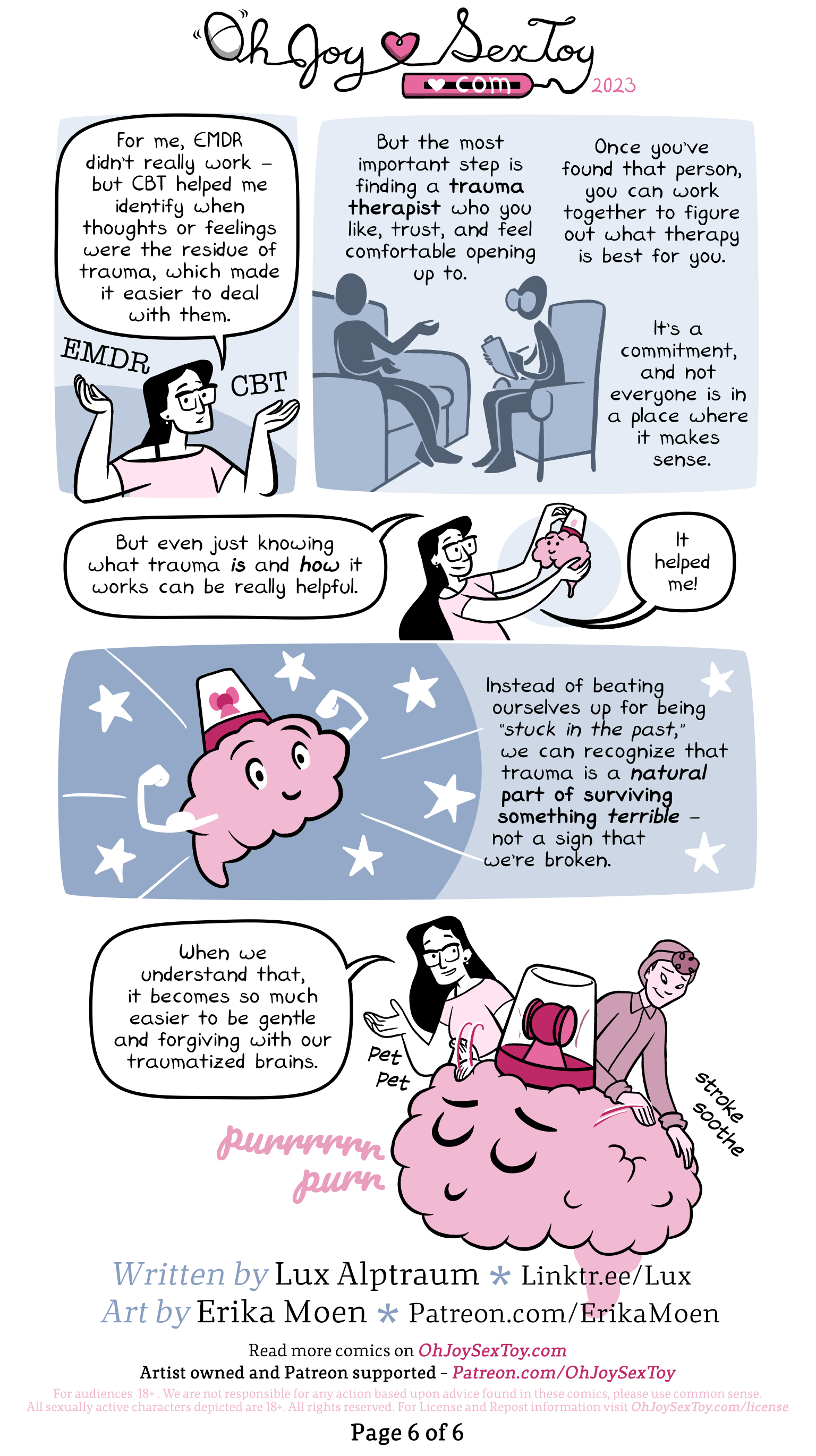
Acclaimed writer Lux Alptraum explains the basics of trauma with illustrations by OJST veteran Erika Moen. It’s a good reminder for all of us to be gentle and exercise forgiveness for ourselves, wherever we are in our life.
BIRTHDAY PLEDGE DRIVE
(There’s even bonus comics and interviews!)***

We truly can’t do this without you!
↓ Comic Transcript
Trauma by Lux Alptraum and Erika Moen
https://www.ohjoysextoy.com/trauma-lux-alptraum-and-erika-moen
April 18, 2023
An East Asian person sits hunched over on the floor, cross-legged. They hold their head in their hands. They wear a beanie with a fluff of bangs showing. They wear a collared button-down shirt with pants.
"It's so ridiculous, I don't know why I'm not over it." The person thinks frantically while jagged lightning bolts radiate out from them. "It happened so long ago. Why is it still hitting me so hard?! I shouldn't care about this any more!"
Lux Alptraum approaches the person, taking their hands to help them stand up. Lux is a cis woman with glasses, long black hair, pierced ears, and wears an off-the-shoulder tight dress, tights, and fashionable short boots.
"Oh, buddy..." Lux says as she pulls the person to their feet. "I know how that feels. I think it's time we talked about... TRAUMA!"
"'Trauma' is a word that gets thrown around a lot these days." Lux continues as she walks by floating oversized faces saying things like "Sounds like a TRAUMA reaction. That TRIGGERED my TRAUMA! Ugh, I was so TRAUMATIZED by that."
"But what exactly IS trauma?" She concludes.
Page 2
"Isn't it when you have PTSD from something really big?" The person asks, while looking over their shoulder a poster for a war movie. "You kowm like those movies where war veterans keep having flashbacks."
"Well, yes and no." Replies Lux.
Narration: At the most basic level, trauma is any injury that overwhelms the body's natural coping and healing mechanisms.
Image: The silhouette of a generic figure getting zapped by lightning bolts on the outside, with their inside filled up with smaller jagged lightning bolts as well.
The person gives Lux a boost to climb up giant 3 as she continues, "Experts like to break emotional trauma down into three types."
Infographic: 3 Types of Trauma
Acute: Trauma develops suddenly in response to a single, extreme event. (Icon of a lightning bolt)
Chronic: Someone is traumatized by a long-term experience like an abusive relationship. (Icon of three jagged arrows pointing at each other, to create a circle)
Complex: Trauma is the result of multiple adverse experiences (Icon of three lightning bolts)
Narration: Trauma is also super, super personal. One person's life-altering trauma could easily be someone else's average tuesday morning.
Image: Two people receive a skull with Xs over its eyes as a message on their phones. The first person has background lightning shocking them while they look in terror at their skull message. The second person simply shrugs and rolls their eyes at the skull message on their phone.
Narration: And the way people respond to trauma can look a range of ways too - even when the trauma source is identical. Someone might:
-Misuse drugs and alcohol or stop using substances all together.
-Constantly want to be around other people or cut off all contact with friends.
-Avoid all sex or seek out many new sex partners.
Page 3
Narration: Every one of these reactions is normal, and specific to the individual. Trauma tends to amp up our regular behaviors to extreme levels - and that can appear in different forms.
A thermometer rests on its side, with its interior liquid turning a deeper red until it bursts from the top explosively. The far, cool end is labeled "Normal" while the exploded end is labeled "Extreme". In between these two ends are the labels, "Mania, overconfidence, depression, flashbacks, anxiety, fawning (trying to please everyone around you), angry outbursts, disassociation, detachment", with a note clarifying, "Just SOME examples - not a comprehensive list!"
Lux now sits on top of a giant brain that has a couple bandaids on it. She is helping pull the person up as they also climb up the brain.
The person asks while climbing, "Okay, so maybe I was traumatized. But why do I still feel so bad? It's been years - isn't it supposed to heal??"
"If only it were that simple!" Commiserates Lux. "One of the reasons why trauma feels so stick and hard to move past is because it literally changes your brain. It took me a very long time to learn to cope with my own traumas, and even now I still struggle with them sometimes."
Narration: Every brain is designed to have an alarm system: When it senses danger, it turns on the alarm system, telling your body to take the steps you need to stay safe.
Image: A brain with an old-timey police siren-light is startled by a background explosion and then proceeds to run away in fear.
Narration: But when a danger is really intense, or when it goes on for a long time, that alarm system can get borked. It gets stuck, and can't shut itself off, or it becomes oversensitive and turns on at a moment's notice, even when there's no real danger around.
Image: A gentle breeze brushes past the brain, which triggers its alarm.
Page 4
"There are three main ways that the brain changes after trauma:" Continues Lux in profile, showing an X-ray of her brain and designating the pre-frontal cortex, amygdala, and hippocampus.
Narration: The pre-frontal cortex goes a little wonky, making it harder to process information and accurately assess what's going on. The amgydala - the brain's alarm center grows, turning into a hypersensitive danger alarm. The hippocampus shrinks, making it harder to remember things."
"Okay." Says the person, leaning on a giant brain that has its siren activated while it stares through binoculars at "The Past". "So my brain's been trained to expect constant danger?"
"Yup!" Shrugs Lux sadly. "And even though it might have been years ago, your brain still thinks you're in that danger zone now."
Narration: It's really easy for that hypersensitive alarm to go off.
Image: The Brain is scared by a black triangle symbol that represents something bad. They experience lightning bolts of shock and upset.
Narration: Sometimes it's kicked into gear by obvious stuff, like descriptions of events and abuse.
Image: The brain mentally makes the connection that black triangles = lightning bolts/bad stuff.
Narration: But really random things can also remind you of that scary tie.
Image: The brain's alarm is triggered when it sees a light blue *blue* triangle amble by, happily whistling a little tune and not interacting with the brain at all.
Page 5
"Uhg -" The person scowls with a music poster behind them. The panel is filled with lightning bolts. "- like how I get anxious when people bring up my ex's favorite band."
"Exactly." Agrees Lux while looking anxiously over her shoulder at floating playing cards. "The card game Magic: The Gathering is a trauma trigger for me1 Anything that your brain connects to your trauma can put you back in that scary place."
Sullenly, the person asks, "So am I just going to be broken forever?"
"You're not broken now!" Cheers Lux. "Trauma may change a brain, but doesn't break it. And it IS possible to reprogram your brain! There are a lot of different therapies that help your brain heal from trauma, including:"
Image: Lux leads a person down a path across a brain with bandaids and places marked out:
Dialectical Behavioral Therapy (DBT)
Cognitive Behavior Therapy (CBT)
Eye Movement Desensitization and Reprocessing (EMDR)
Psychedelic-assisted therapy (involving drugs like ketamine, psilocybin, and MDMA)
"And more (They continue to learn and develop all kinds of treatments)." Explains Lux. "Not every therapy works for every person, and it may take some trial and error to figure out what's right for you."
Page 6
Lux holds up the words EMDR in one hand and CBT in the other while she explains, "For me, EMDR didn't really work - but CBT helped me identify when thoughts or feelings were the residue of trauma, which made it easier to deal with them.
Narration: But the most important step is finding a trauma therapist who you like, trust, and feel comfortable opening up to. Once you've found that person you can work together to figure out what therapy is best for you. It's a commitment, and not everyone is in a place where it makes sense.
Image: Silhouettes of a patient sitting on a couch, talking to their therapist.
"But even just knowing what trauma IS and HOW it works can be really helpful." She pets a tentatively smiling brain with an inactive alarm. "It helped me!"
A brain flexes its arms, making its muscles pop. The alarm on their head is inactive and stars dance around it.
Narration: Instead of beating ourselves up for being 'stuck in the past,' we can recognize that trauma is a natural part of surviving something terrible - not a sig that we're broken.
"When we understand that, it becomes so much easier to be gentle and forgiving with our traumatized brains." Lux explains while she and the person pet and stroke a purring, content, oversize brain.
Written by Lux Alptraum - Linktr.ee/Lux
Art by Erika Moen - patreon.com/ErikaMoen
https://www.ohjoysextoy.com/trauma-lux-alptraum-and-erika-moen/
Trauma by Lux Alptraum and Erika Moen
https://www.ohjoysextoy.com/trauma-lux-alptraum-and-erika-moen
April 18, 2023
An East Asian person sits hunched over on the floor, cross-legged. They hold their head in their hands. They wear a beanie with a fluff of bangs showing. They wear a collared button-down shirt with pants.
"It's so ridiculous, I don't know why I'm not over it." The person thinks frantically while jagged lightning bolts radiate out from them. "It happened so long ago. Why is it still hitting me so hard?! I shouldn't care about this any more!"
Lux Alptraum approaches the person, taking their hands to help them stand up. Lux is a cis woman with glasses, long black hair, pierced ears, and wears an off-the-shoulder tight dress, tights, and fashionable short boots.
"Oh, buddy..." Lux says as she pulls the person to their feet. "I know how that feels. I think it's time we talked about... TRAUMA!"
"'Trauma' is a word that gets thrown around a lot these days." Lux continues as she walks by floating oversized faces saying things like "Sounds like a TRAUMA reaction. That TRIGGERED my TRAUMA! Ugh, I was so TRAUMATIZED by that."
"But what exactly IS trauma?" She concludes.
Page 2
"Isn't it when you have PTSD from something really big?" The person asks, while looking over their shoulder a poster for a war movie. "You kowm like those movies where war veterans keep having flashbacks."
"Well, yes and no." Replies Lux.
Narration: At the most basic level, trauma is any injury that overwhelms the body's natural coping and healing mechanisms.
Image: The silhouette of a generic figure getting zapped by lightning bolts on the outside, with their inside filled up with smaller jagged lightning bolts as well.
The person gives Lux a boost to climb up giant 3 as she continues, "Experts like to break emotional trauma down into three types."
Infographic: 3 Types of Trauma
Acute: Trauma develops suddenly in response to a single, extreme event. (Icon of a lightning bolt)
Chronic: Someone is traumatized by a long-term experience like an abusive relationship. (Icon of three jagged arrows pointing at each other, to create a circle)
Complex: Trauma is the result of multiple adverse experiences (Icon of three lightning bolts)
Narration: Trauma is also super, super personal. One person's life-altering trauma could easily be someone else's average tuesday morning.
Image: Two people receive a skull with Xs over its eyes as a message on their phones. The first person has background lightning shocking them while they look in terror at their skull message. The second person simply shrugs and rolls their eyes at the skull message on their phone.
Narration: And the way people respond to trauma can look a range of ways too - even when the trauma source is identical. Someone might:
-Misuse drugs and alcohol or stop using substances all together.
-Constantly want to be around other people or cut off all contact with friends.
-Avoid all sex or seek out many new sex partners.
Page 3
Narration: Every one of these reactions is normal, and specific to the individual. Trauma tends to amp up our regular behaviors to extreme levels - and that can appear in different forms.
A thermometer rests on its side, with its interior liquid turning a deeper red until it bursts from the top explosively. The far, cool end is labeled "Normal" while the exploded end is labeled "Extreme". In between these two ends are the labels, "Mania, overconfidence, depression, flashbacks, anxiety, fawning (trying to please everyone around you), angry outbursts, disassociation, detachment", with a note clarifying, "Just SOME examples - not a comprehensive list!"
Lux now sits on top of a giant brain that has a couple bandaids on it. She is helping pull the person up as they also climb up the brain.
The person asks while climbing, "Okay, so maybe I was traumatized. But why do I still feel so bad? It's been years - isn't it supposed to heal??"
"If only it were that simple!" Commiserates Lux. "One of the reasons why trauma feels so stick and hard to move past is because it literally changes your brain. It took me a very long time to learn to cope with my own traumas, and even now I still struggle with them sometimes."
Narration: Every brain is designed to have an alarm system: When it senses danger, it turns on the alarm system, telling your body to take the steps you need to stay safe.
Image: A brain with an old-timey police siren-light is startled by a background explosion and then proceeds to run away in fear.
Narration: But when a danger is really intense, or when it goes on for a long time, that alarm system can get borked. It gets stuck, and can't shut itself off, or it becomes oversensitive and turns on at a moment's notice, even when there's no real danger around.
Image: A gentle breeze brushes past the brain, which triggers its alarm.
Page 4
"There are three main ways that the brain changes after trauma:" Continues Lux in profile, showing an X-ray of her brain and designating the pre-frontal cortex, amygdala, and hippocampus.
Narration: The pre-frontal cortex goes a little wonky, making it harder to process information and accurately assess what's going on. The amgydala - the brain's alarm center grows, turning into a hypersensitive danger alarm. The hippocampus shrinks, making it harder to remember things."
"Okay." Says the person, leaning on a giant brain that has its siren activated while it stares through binoculars at "The Past". "So my brain's been trained to expect constant danger?"
"Yup!" Shrugs Lux sadly. "And even though it might have been years ago, your brain still thinks you're in that danger zone now."
Narration: It's really easy for that hypersensitive alarm to go off.
Image: The Brain is scared by a black triangle symbol that represents something bad. They experience lightning bolts of shock and upset.
Narration: Sometimes it's kicked into gear by obvious stuff, like descriptions of events and abuse.
Image: The brain mentally makes the connection that black triangles = lightning bolts/bad stuff.
Narration: But really random things can also remind you of that scary tie.
Image: The brain's alarm is triggered when it sees a light blue *blue* triangle amble by, happily whistling a little tune and not interacting with the brain at all.
Page 5
"Uhg -" The person scowls with a music poster behind them. The panel is filled with lightning bolts. "- like how I get anxious when people bring up my ex's favorite band."
"Exactly." Agrees Lux while looking anxiously over her shoulder at floating playing cards. "The card game Magic: The Gathering is a trauma trigger for me1 Anything that your brain connects to your trauma can put you back in that scary place."
Sullenly, the person asks, "So am I just going to be broken forever?"
"You're not broken now!" Cheers Lux. "Trauma may change a brain, but doesn't break it. And it IS possible to reprogram your brain! There are a lot of different therapies that help your brain heal from trauma, including:"
Image: Lux leads a person down a path across a brain with bandaids and places marked out:
Dialectical Behavioral Therapy (DBT)
Cognitive Behavior Therapy (CBT)
Eye Movement Desensitization and Reprocessing (EMDR)
Psychedelic-assisted therapy (involving drugs like ketamine, psilocybin, and MDMA)
"And more (They continue to learn and develop all kinds of treatments)." Explains Lux. "Not every therapy works for every person, and it may take some trial and error to figure out what's right for you."
Page 6
Lux holds up the words EMDR in one hand and CBT in the other while she explains, "For me, EMDR didn't really work - but CBT helped me identify when thoughts or feelings were the residue of trauma, which made it easier to deal with them.
Narration: But the most important step is finding a trauma therapist who you like, trust, and feel comfortable opening up to. Once you've found that person you can work together to figure out what therapy is best for you. It's a commitment, and not everyone is in a place where it makes sense.
Image: Silhouettes of a patient sitting on a couch, talking to their therapist.
"But even just knowing what trauma IS and HOW it works can be really helpful." She pets a tentatively smiling brain with an inactive alarm. "It helped me!"
A brain flexes its arms, making its muscles pop. The alarm on their head is inactive and stars dance around it.
Narration: Instead of beating ourselves up for being 'stuck in the past,' we can recognize that trauma is a natural part of surviving something terrible - not a sig that we're broken.
"When we understand that, it becomes so much easier to be gentle and forgiving with our traumatized brains." Lux explains while she and the person pet and stroke a purring, content, oversize brain.
Written by Lux Alptraum - Linktr.ee/Lux
Art by Erika Moen - patreon.com/ErikaMoen
https://www.ohjoysextoy.com/trauma-lux-alptraum-and-erika-moen/




